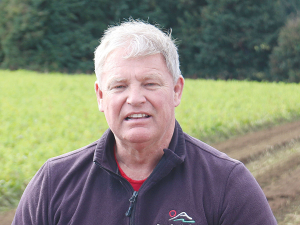Cold comfort for Brussels Sprouts
A cold growing season has thrown something of a spanner in the works for many commercial growers around Ohakune in the Central North Island.
 Bruce Rollinson says councils should be encouraging resource consents rather than looking at taking them away or reducing them.
Bruce Rollinson says councils should be encouraging resource consents rather than looking at taking them away or reducing them.
Commercial grower Bruce Rollison says he's spending a lot of time dealing with existing regulations and planning to deal with new ones that keep appearing.
A former Horizons Regional councillor, Rollison has a very clear understanding of what's required to achieve quality environmental standards, but at the same time allow growers to do their job and not be led down blind alleyways by out of touch bureaucrats.
The Ohakune vegetable grower and his wife Steph say many of the people making regulations have no expertise and no sense of what is practical. He says that he spends much of his time trying to educate such people.
For example, says Bruce he needed a water take to wash vegetables so they could send clean product to market. But the council indicated they would make it harder to get a consent.
"I pointed out, if we end up having to send dirty vegetables to the market, it will cost more to transport them. I told them if you wash vegetables in the city that dirt will go down into wastewater treatment plants as opposed to it being retained on farm and spread on the paddocks," he says.
The Rollinsons say councils should be encouraging resource consents rather than looking at taking them away or reducing them.
They says the regulatory systems seem to overlap and should be streamlined. They say the councils don't seem to understand that they don't have an HR department or a science department.
"We don't need the environmental police coming around with a clip board, watching us and ticking off something Steph has already ticked off," says Bruce.
He says the industry is not attracting any new entrants because they are barriers, such as the price of land, and even existing large growers are finding succession planning hard because their children want to be lawyers and accountants rather than working the land.
"I can honestly see a day when the industry might be covered by just four or five corporate growers," says Bruce.
He says he's very frustrated with the regional council and says they don't appear to have "read the tea leaves" about the proposed government changes to the RMA and are carrying on as if nothing is happening.
Vegetable Turn Off
Steph Rollison says one of the problems that they and other growers are facing is that consumers are buying less fresh vegetables.
She says this harks back to media reports which have continually told people vegetables are too expensive. This is not the case now, she says, but the message has not through to consumers that vegetables are now very reasonably priced.
Much of the shortage and high prices came about last year because of the devastating rains and cyclones which destroyed crops; with reduced supply, prices naturally rose.
"So, with all this negative publicity, price has become a factor because consumers have been told it is a factor, and in the supermarket, people are now just buying the 'specials'. So, unless your product is a special, in many cases consumers won't buy it," she says.
Steph says the consumption of fresh vegetables now appears to be lower than it was druing the days of Covid-19. She says they often do specials with supermarkets and this is planned well in advance. She says the reality is they are around 25% cheaper than they were a year ago.
Bruce says the other issue that is off-putting to consumers is product is sold on a dollar per kilo basis. He notes for example Brussel sprouts may look expensive at $14/kg, but people need to buy only a faction of that amount for a meal, hence they are not expensive.
Voting has started for the renewal of DairyNZ's milksolids levy.
The most successful catchment groups in NZ are those that have 'a source to sea' approach.
Associate Agriculture Minister and Manawatu dairy farmer Andrew Hoggard says the free trade agreement (FTA) negotiated with India is not a bad deal and his party, Act, will support it when it goes before Parliament.
Newly released data from Environment Canterbury (ECan) Farm Environment Plan (FEP) audits are showing a dramatic lift in environmental performance across the region.
A solid recovery of global dairy prices this year makes a $9.50/kgMS milk price almost a shoo-in for this season.
As New Zealand marks the United Nations’ International Year of the Woman Farmer 2026 (IYWF 2026), industry leaders are challenging the misconception that women only support farming.

OPINION: Here w go: the election date is set for November 7 and the politicians are out of the gate…
OPINION: ECan data was released a few days ago showing Canterbury farmers have made “giant strides on environmental performance”.